Reducing the threat of snares in the Budongo Forest
26/06/2016 in Conservation
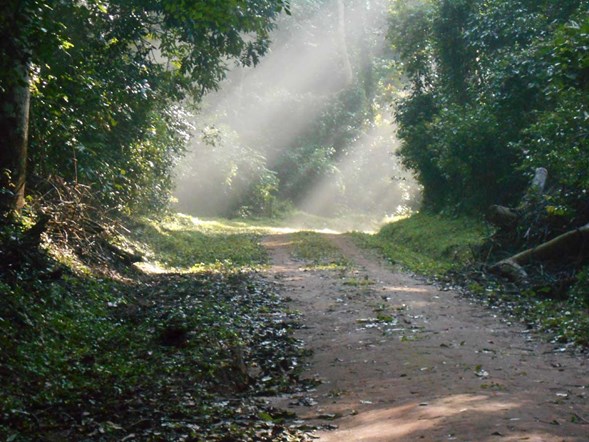
Snares are the most common type of traps used to hunt illegally within the Budongo Forest. Typically made of nylon or metal wire, the snares are set to trap their target – normally bush pigs – by either the neck or the leg. Although not hunted directly as a source of food, chimpanzees sadly also often fall victim to these traps as they go about their daily lives in the forest. Injuries are often severe, maimed limbs are not uncommon, and snare incidents can even be fatal.
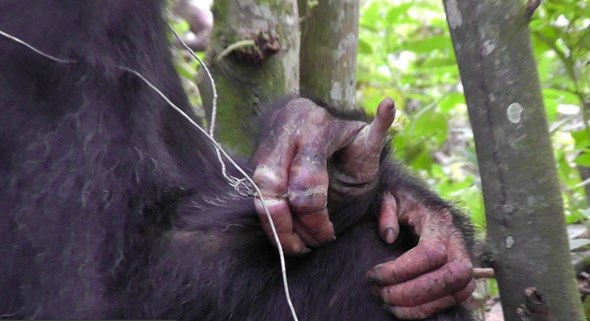
(Chimp caught in a metallic snare)
Recognising the significant threat posed by snares to chimpanzees and other wild fauna in the forest, the Budongo Conservation Field Station (BCFS) set out to intervene and in 2002 launched the snare patrol programme. Patrolmen were made up of former hunters who agreed to denounce illegal forest activities and pledge their commitment to conservation. Ex-hunters have the skill and experience to find the snares that are set in the forest. The programme started with only two patrolmen and the results were immediate. Solely recovering snares, however, would not be sustainable in the long term. Finding a way to discourage hunting of this nature was the ultimate goal.
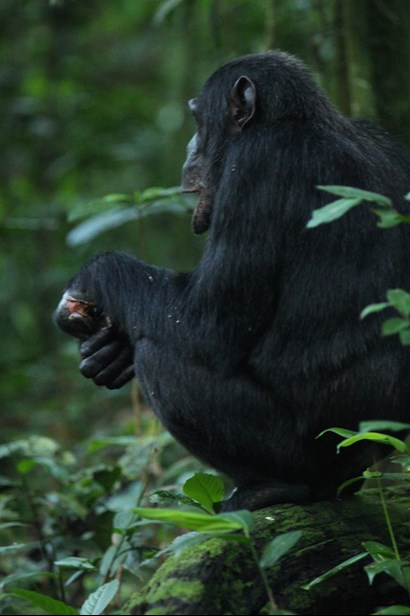
(Chimp recovering after snare removal surgery)
The BCFS alternative livelihood programme started with ex-hunters and has since expanded to include other illegal forest users such as pit sawyers as project beneficiaries. BCFS has also identified and included vulnerable community members that relied on the forest for their wellbeing and survival. As part of the project, beneficiary households are provided with two breeding goats as an alternative source of animal protein among other benefits. In return, participants are required to denounce their illegal use of forest resources and support conservation work.
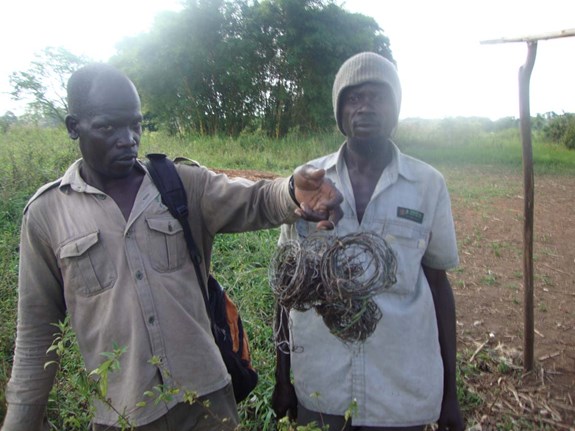
It has not all been easy and challenges have been faced along with the way. The patrolmen, for instance, faced a lot of animosity, threats and insults initially from the wider hunting community. Over time, however, through education and the alternative livelihood project, these communities are starting to appreciate the need for conservation. In turn the number of individuals willing to stop illegal activities and join in the conservation efforts are growing. BCFS currently employs six patrolmen who search for and recover snares laid in the forest. They conduct daily patrols in addition to participating in joint patrol sessions with former hunters benefiting from the alternative livelihood programme.
In addition to the snare patrols, the veterinary team at BCFS are also on call to rescue and treat chimpanzees that are reported to have suffered snare injuries. Reported injuries have reduced to only three in the last year compared to the eight that were reported at the start of the project.
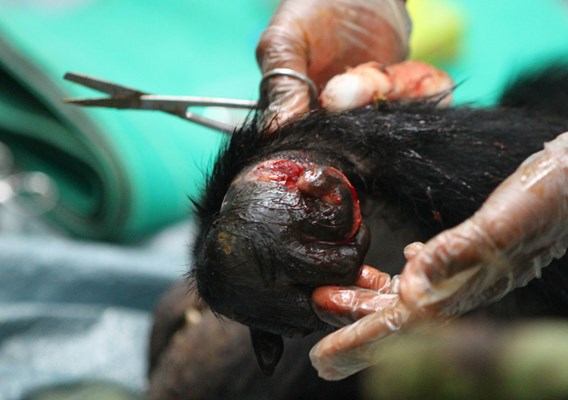
(Garret had suffered from a nylon snare injury for over 15 years with fresh injury inflicted frequently -Vets from JGI, BCFS, UWA and NCP teamintervened)
Although the threat of snares still exists, thanks to the the efforts of the patrol teams, the alternative livelihood scheme and conservation education with local communities, it is noticeably reduced. At the onset of the snare patrol programme around 45 snares were recovered each day; compared with the current average of around seven per day recovered by a team three times the size, the progress is clear. A survey of the wild fauna is planned and is expected to provide further insight on the effectiveness of the snare patrol programme.
I look forward to sharing more details on the snare patrol team progress and how the programmes at BCFS are impacting the lives of the ex-hunters in future updates.
Until next time,
Jacintha N. Lwebuga
BCFS Communication Coordinator
Featured Articles

An update from the Budongo Forest
19/04/2024 in Conservation

Edinburgh Zoo named best zoo in Scotland
15/04/2024 in Edinburgh Zoo
Latest News
-
Blog

19/04/2024
An update from the Budongo Forest
The Budongo Conservation Field Station (BCFS) in Uganda is one of our wildlife conservation charity’s longest partnerships.
-
Blog

02/02/2021
Celebrating sixteen years of partnership with BCFS
The Royal Zoological Society of Scotland (RZSS) has partnered with the Budongo Conservation Field Station (BCFS) in Uganda since 2005. For 16 years we’ve worked together to protect the Budongo Forest and the 800 chimpanzees who call it home.
-
Blog

01/12/2020
Budongo Conservation Field Station Update
Your support has protected the chimpanzees of the Budongo Forest in Uganda for over 15 years, and this year it has meant more than ever.
-
Blog

13/04/2020
RZSS Goes Wild conservation video series
From our conservation team's living room, to yours! Our new #RZSSGoesWild web series will take you around the world via the amazing wildlife conservation projects we support.







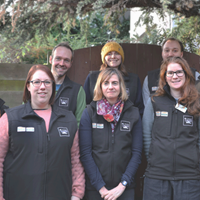














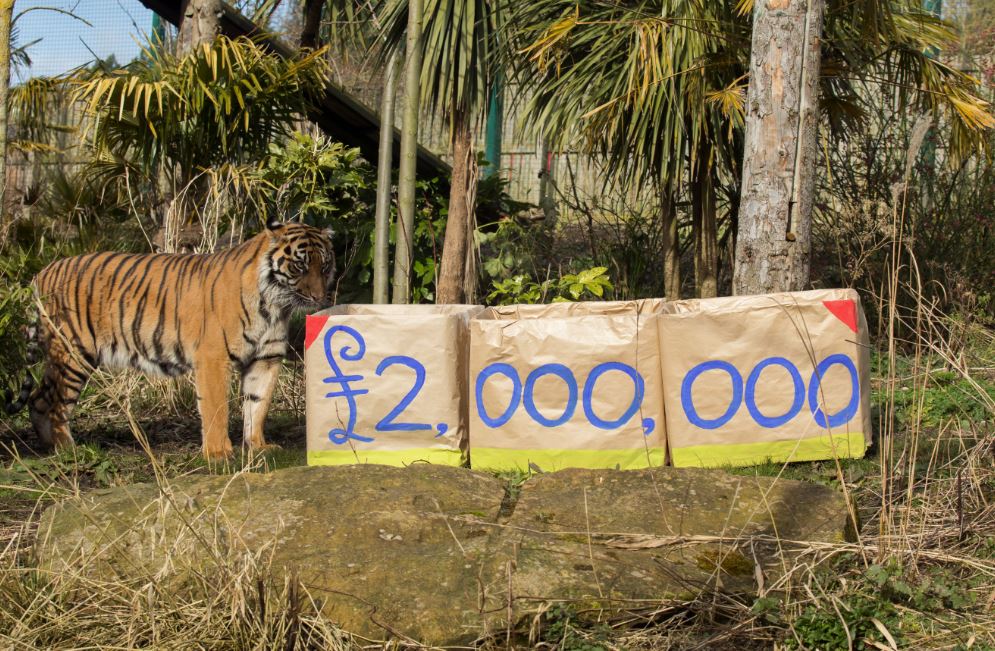


Follow EZ